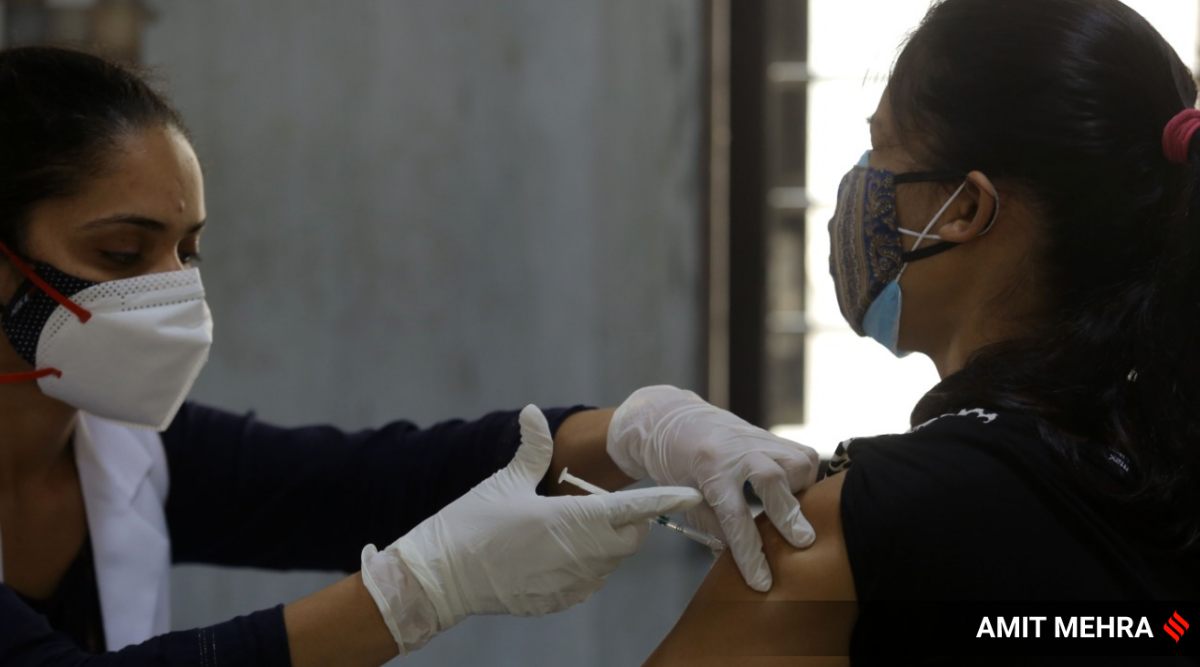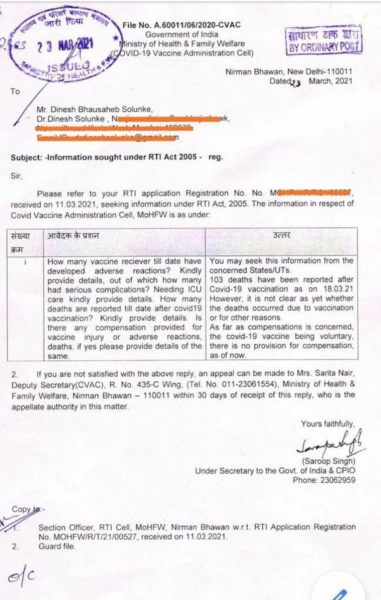With so many fears and uncertainties looming, coercive measures to administer vaccines will only create further panic
 In light of uncertainty over vaccine availability, many people might not be vaccinated for no fault of their own, such as students who will suffer huge academic setbacks if not allowed to give their exams.
In light of uncertainty over vaccine availability, many people might not be vaccinated for no fault of their own, such as students who will suffer huge academic setbacks if not allowed to give their exams.
Written By Gatha and Tanvi Singh
The Gujarat Technological University, Ahmedabad, via an order dated 22nd April 2021, has made it mandatory for all students above 18 years of age to be vaccinated before filling their Winter 2021 examination form. This is despite the decision by the Union Ministry of Health and Family Welfare that the vaccination is entirely voluntary. As per the Frequently Asked Questions on the Covid-19 vaccine issued by the Ministry of Health and Family Welfare, “Vaccination for Covid-19 is voluntary. However, it is advisable to receive the complete schedule of Covid-19 vaccine for protecting oneself against this disease and also to limit the spread of this disease to close contacts including family members, friends, relatives and co-workers.”
Further, according to an RTI reply received from the Ministry of Health and Family Welfare, dated 23rd March 2021, regarding compensation provided for injury or adverse reactions or deaths from the vaccine, the Ministry of Health and Family Welfare replied as follows;
“As far as compensation is concerned, the Covid-19 vaccine being voluntary, there is no provision for compensation as of now.”

In light of this decision of the Union Health Ministry, the circular by Gujarat Technological University should be deemed illegal. However, there is a high chance that more institutions will follow suit and take such coercive measures. Therefore, we need to try and understand why this is a dangerous precedent to set.
Access disparity: Any mandatory measure to administer vaccines rests on the assumption that vaccine availability is ensured for all on an equitable basis. The ground reality, however, is very different. Several states have already announced that the vaccination drives for the 18-45 age category, which was to be started on May 1, will be delayed due to a vaccine shortage. While registration started on the COWIN portal on 28th April, there seems to be no slot available for people in the age category of 18-45 years in most states. Several state governments have announced free vaccination for all in the age category of 18-45, while many still have not. The prices fixed for private hospitals in India are also high. When vaccines are in short supply, medical providers must decide who should be protected and who should be left vulnerable to the disease. Challenges in accessing healthcare will be faced more by the marginalised and vulnerable communities. Thus, a mandatory vaccination policy will further the gaps and inequalities in society and disproportionately affect the poor and marginalised communities.
In light of uncertainty over vaccine availability, many people might not be vaccinated for no fault of their own, such as students who will suffer huge academic setbacks if not allowed to give their exams.Opinion |The harsh truth behind India’s grand Covid vaccination claim
Informed consent and individual autonomy of individuals: Consent becomes valid when the person is competent to consent, and it is informed consent. In medical jurisprudence, informed consent of the patient is essential for any decision. This right to informed consent is part of individual liberty and autonomy. The principle of individual autonomy is enshrined within the right to life and personal liberty under Article 21 of the Indian Constitution. Making vaccination mandatory will thereby be depriving them of their fundamental right to life. Moreover by forcing citizens to be vaccinated through coercive measures, the state is depriving them of their right to decisional and bodily autonomy, which constitutes a violation of their right to privacy as well (Justice K. S. Puttaswamy (Retd.) and Anr. vs Union Of India And Ors. 2017 10 S.C.C. 1).
There is a need to provide basic information about the vaccine risks to the patients or parents to make informed decisions. When such data does not exist, and there are so many confusions among people, it is challenging for them to make an informed choice, thereby depriving them of their fundamental right under Article 21.
Nature and purpose of the vaccine: After analysing the current speed of vaccination, various studies have suggested that it would take years to vaccinate the entire Indian population. According to the present vaccination and population data, it has been calculated that we would be able to vaccinate 100 per cent of our population with both doses in a minimum of 4 years (calculation based on India’s population as per NSO’s second advance estimate for FY21 & vaccination data from MoHFW till 30th April 2021). Other reports suggest that we would get a maximum of 30 per cent of the population vaccinated by the end of 2021. With no clarity regarding the period of the effectiveness of the vaccine or its effectiveness against the new mutants, denial of entitlements and rights based on mandatory vaccination requirements should be held illegal.
Recently, Bharat Biotech received permission to test if giving a third dose of Covaxin to participants of clinical trials, six months after the second dose, would boost the body’s immunity for a more extended period. This would either make the duration of the vaccination process even longer, or it would mean that a regular dose to boost immunity is the key to reducing the disease’s risk. All these ongoing studies and reports further raise several practical questions such as whether an individual will be considered vaccinated even after the period of its effectiveness wears off, or even when it is proved that the vaccine is not effective against the new virus variants. Will the country have to start another round of re-vaccination of the entire population when the effect of the first vaccination wears off, or will there be booster shots? Till we have answers to these questions, a mandatory vaccination order will only foster further panic and ambiguities.
According to Sandhya Shrinivasan, the idea of penalising anti-vaxxers of Covid-19 stems from the belief that the vaccination will protect others and not getting one will put others at risk. She clarified that the current vaccine has only been tested for its ability to prevent disease and not infection. Infection is when a virus that can cause a disease enters our body, and disease is when that virus starts to attack our cells. According to Sandhya, “the primary objective of the vaccine is to protect the individuals against severe diseases or death”. Therefore, the vaccine is for the protection of the individual taking the vaccine. The studies are yet to show if it will lead to population immunity if administered on sufficient population proportion. In such a situation, vaccination should be made a personal choice.
International bodies like the World Health Organisation have disapproved of mandatory vaccination measures. While it is crucial to strike a balance between individual autonomy and public health, such ethical negotiations cannot occur when there are considerable obstacles in accessing healthcare and requisite information.
With so many fears and uncertainties looming, a coercive measure to administer the vaccines will only create further panic and fail to increase its uptake. The government should utilise this time to create awareness and remove misinformation on the vaccination processes to facilitate its administration organically. Accessibility of vaccines is a state duty, and if they falter on it, then no citizen should be punished for the same.
Gatha and Tanvi Singh are Research Associates at the Centre for Social Justice, Ahmedabad. This article was initially published at The Indian Express on 7th May, 2021. All views expressed are personal.
